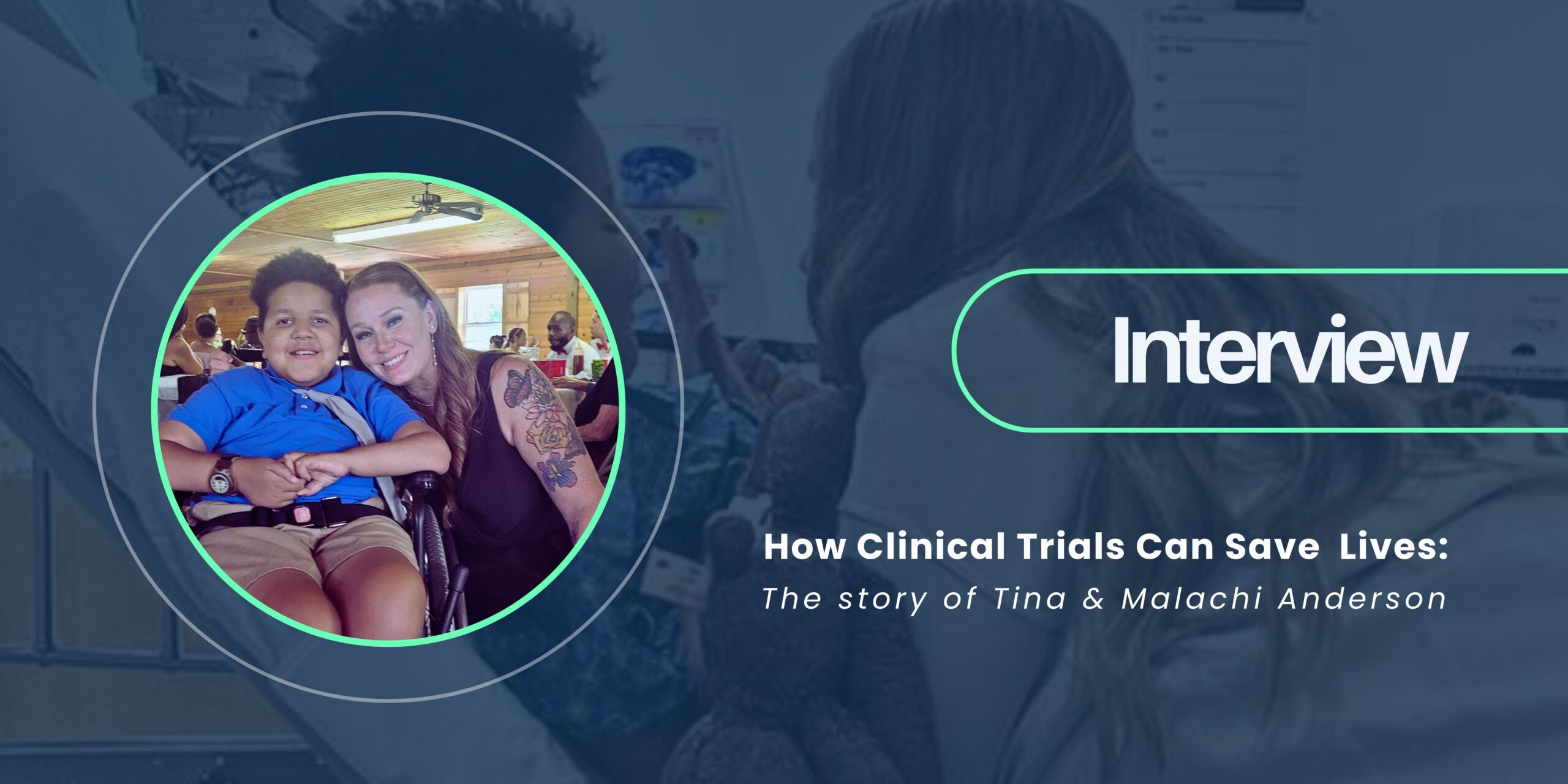
How Clinical Trials Can Save Lives :
The Story of
Tina & Malachi Anderson
Tina, when did you first discover Malachi had Spinal Muscular Atrophy (SMA)?
Tina: Malachi was born perfectly normal; he passed all his APGAR tests. Two months into his life he began to lose function and couldn’t lift his head, arms, or legs. He wasn’t meeting the milestones a 2-month-old baby would typically make.
People would say things like “he’s fine”, “he’s a boy”, “he’s lazy”, or “he’ll get there”. However, my mom-intuition told me something wasn’t right. I called our pediatrician and got Malachi in for an appointment the next day. He wasn’t sick, but something was off.
An hour or two after the appointment the pediatrician called and based on the severity of Malachi’s symptoms, he scheduled another next day appointment for Malachi at Nationwide Children’s Hospital in Columbus, Ohio. The next day, we spent four hours at the appointment. Mal’s blood was tested, and he underwent an exam to evaluate his strength. We waited 10 days for a follow-up appointment call.
Our next appointment, a bomb was dropped. We found out Malachi had Spinal Muscular Atrophy (SMA) type 1, a severe genetic condition affecting infants. At the time there weren’t really any treatment options for SMA and most children with SMA didn’t live past two years old.
With that being the case, I started to search for clinical trial options. The first study I found was SPINRAZA which was a spine injection every three months, but it was a placebo-based study located in Chicago. That would have been extremely difficult as we’d be removing Malachi from his family and potentially receive a placebo which was too much of a risk.
Eventually I discovered a study in Columbus for an open-label gene therapy with no placebos. I fought hard to get Malachi into the trial. Somedays I was calling Nationwide Hospital 14 to 15 times a day. A doctor on the team for the gene therapy caught wind that I was calling and told her team “We must get every newly diagnosed child in these doors as soon as possible.”
After 26 days of testing, Malachi qualified for the gene therapy trial. He was dosed on December 2nd, and he was just shy of 4 months old. At the time he had lost nearly all mobility. His hands were down at his sides, and he could barely move his feet
Did you have any apprehension about enrolling Malachi in a clinical trial? And if so, did anything change your mind?
Tina: It was slightly traumatizing as we had to sign an autopsy form. God forbid Mal didn’t make it, they would do an autopsy to see if it was related to the gene therapy or 100% SMA. I wasn’t sure if I could go through all of that. My husband and I went into deep discussions and felt pressure to move quickly due to Mal’s condition. We felt if we did the trial – Mal possibly lives, gets stronger, and lives a healthy life. If we don’t do the trial – we risk Mal not making it at all.
There was nothing we could do to keep him here with us other than palliative measures. Kids with SMA are very cognitive, they hear and understand everything, and we couldn’t do that to him. It was scary, we didn’t know what the drug would do short term or long-term.
That does sound scary. Was there anyone that supported you during this process?
Tina: We had Chris Petek (Now CTNx COO) who was on the trial’s research team at the time. Chris was incredibly supportive. I can’t imagine the process without him. He was always there to say, “Hey, these are the gains we’re noticing for other kids”. Chris was encouraging, but not pushy.
It was a life-or-death decision and there were times we spoke to Chris at midnight. We would think of something and call or text him. And Chris always made himself available to us.
How were you feeling going into the trial after Malachi got accepted?
Tina: It was nerve-racking. You go into it blindly and don’t know the other families in the study. Mal was patient number 14 out of 15 in the entire world to get the drug. Slowly we figured out who the other families were as their children looked similar; it felt like we found each other
What stood out the most during the clinical trial, and how did it alter your view of clinical trials as a whole?
Tina: After Malachi’s first dose, we saw progress within the first 12 hours. For us, it was magical, I know that’s kind of a weird word to use, but it was. We had no idea what to expect after him being still for so long. It truly was magic.
Can you tell us about the drug Malachi took?
Tina: ZOLGENSMA is a one-time dose gene therapy that helps sleeping motor neurons essentially regenerate so patients can gain muscle and strength where the mutated gene had killed off the neuro genes.
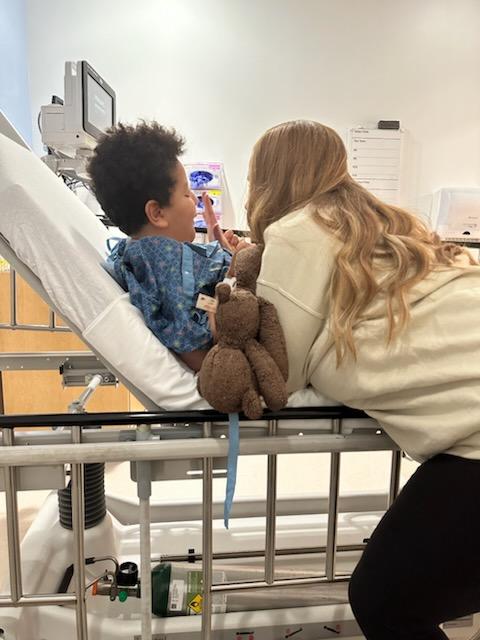
Has Malachi seen any long-term gains
from the treatment?
Tina: Nine years later, we’re still seeing growth, but back to those first 12 hours, Mal showed more leg movement than in the prior two months! He began rolling and would roll down the hallway as his mobility continued to improve. The hardest thing for kids with SMA is head control and strength in general, which is still a struggle today, but it’s got a lot better. Before Malachi would have never been able to propel himself in his wheelchair, now he does almost all day at school. Malachi can now do wheelies and everything in his wheelchair, so he’s happy!
I keep 1-2LB weights at Malachi’s desk to lift when he sits to maintain what he’s gained. He loses strength after rod surgery; the rods are placed in his shoulders. Malachi will have annual check-ups until he’s full grown, followed by huge spinal fusion surgery.
What advice would you give to someone who has recently been diagnosed with
Spinal Muscular Atrophy?
Malachi: Never give up.
Tina: Get treatment as quickly as possible. There’s been great results with ZOLGENSMA. Early treatment can stop babies from showing symptoms of SMA and offer a chance that they never see symptoms at all. They can potentially hit milestones and be able to walk, run, and climb on time if they’re dosed. We got it during trial and didn’t pay for it, but I would have sold everything I had to get my son what he needed.
Malachi, can you tell us how old you are and what grade you are in
Malachi: Nine and I am in fourth grade.
Is there anything exciting going on in school?
Malachi: Recently my mom came in and talked to my fourth-grade class. I helped her talk about advocacy because I often advocate for myself.
Tina: Yes, the school asked me to come and speak on the importance of advocacy, for yourself and others. It’s opened doors for Malachi. It’s a way for the kids to better understand a day in the life of Malachi.
We brought 3 wheelchairs in and kids could spend a portion of the day in the wheelchair and see what it’s like trying to navigate the day. We hoped to teach empathy and compassion for other’s differences. We’re currently working with the school on a huge project for more accessible outdoor areas. Malachi’s whole grade has come up with ideas!
What are your favorite technologies or tools that have significantly improved
Malachi’s quality of life.
Tina: Mal’s growing rods have been huge. Prior he was so tiny, he almost looked malnourished. Every two months I take Mal to Columbus to have the rods lengthened. They use a machine that finds a magnet which then turns and lengthens the rods which are on each side of his spine.
At one point his spine’s muscle mass was so low; Mal’s spine was basically C-shaped. It affected his breathing, and he couldn’t eat. He was constantly hungry and could only take a few bites of food before he was full as there was nowhere for the food to go. Getting enough nutrients and gaining weight was nearly impossible. Now he eats because he’s bored.
A downfall of the rods is losing strength each time he has surgery and building it back. The rods also help breathing, most SMA kids have lung issues because of low muscle tone. It’s all worth it though, Mal gets independence, even small things like being able see out the car window.
What would you say are some common misconceptions about Spinal Muscular Atrophy and what do you wish people understood more about it?
Tina: The biggest misconception about children with SMA is that they can’t be independent. Insurance often dismisses requests for necessary equipment, assuming these children are bedridden and ventilated. SMA children that are not treated by two years old must be ventilated and can’t eat or breathe on their own and are fed through a G-tube. Despite the fact that many treated SMA kids are able to do things, it’s a fight every time we need something. Even things like a new wheelchair, they’ll try to say, “it’s not needed” or “They’re bedridden” and that’s not the case.
People assume SMA kids are not capable of doing things. Malachi is a great example. He has come so far. Malachi even helps me in the kitchen and aspires to be a chef like my husband, who was an executive chef at Landoll’s Castle and Malabar’s Farm restaurant.
Malachi are there any special dishes you’re trying to learn right now or enjoy to eat?
Malachi: I want to try making chicken and Mexican rice with corn. Also, I recently made maple glazed pork chops, but I like eating steak and potatoes or sushi!
Tina: He’s an expensive child. Mal has been eating sushi since he was like two. My other kids won’t touch it.
Malachi what are some other hobbies or things you like to do?
Malachi: Gaming. I’m good at it! Also, reading and biking.
Tina: A Foundation out of Columbus called Christopher’s Promise helped us. They came up with the money and donated a bike for Malachi. We’ve ridden that quite a bit.
How has SMA influenced your perspective on life or your personal goals?
Tina: It’s made us all more compassionate people. We’ve always taught our kids to be “bucket-fillers”. If you see someone struggling, help them. Whether you are friends or not, inclusion is important. That’s why I’ve got into advocating at Malachi’s school. Everyone should be able to feel included.
A girl at his school, came up to me after I spoke at his school and said, “I’m different, but I’m different on the inside.” She kind of looked around nervously before continuing “you made me not afraid to speak about me.” She’s 9 and has diabetes. Malachi’s story helped her feel comfortable. We all battle something, so we strive to be compassionate, empathetic, and caring toward others.
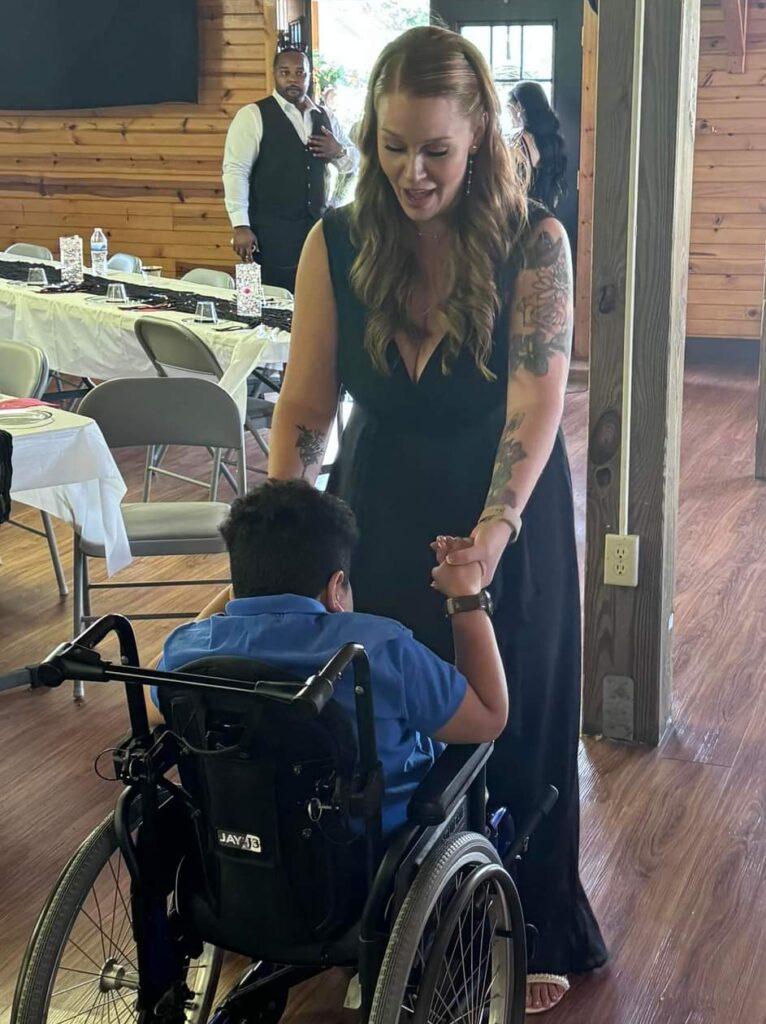
As someone living with SMA what have been some of your most memorable or meaningful experiences?
Malachi: I got baptized. I didn’t want to at first, but I changed my mind. It feels like a great achievement.
Tina: Three years ago, Malachi’s good friend Payton was in a car accident and passed away. At her funeral our pastor spoke about picking up the mantle from where Payton left off and to love and live like Payton did. That day Malachi’s decided to be baptized on his own as he was listening to Payton’s favorite song to sing “ain’t no grave that will hold my body down.”
We believe God planted us where we needed to be to get into that gene trial. There was a time when Malachi was first diagnosed, and my husband and I were angry at God. We thought “why would you do this?” Then one day I remember saying to my husband, “Torrence, we must give Malachi to god or Malachi’s life is going to be in vain.”
We prayed and two days later we got a call from Nationwide about participating in the study. It was crazy because they scheduled his first appointment on the anniversary of my mother’s passing. At that point we felt “God has got us” and my mom was our guardian angel. From there, it was wild how fast everything started happening.
Gene therapy is what saved Mal’s life ultimately, but I don’t know we would have been put on that path if we didn’t follow our faith.
We want to express our gratitude to Malachi and Tina for taking the time to meet with us and share their journey in clinical research. They provided valuable insights into living with SMA and how participating in clinical research significantly impacted Malachi’s life. Thank you both!


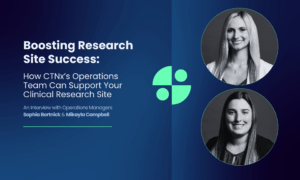
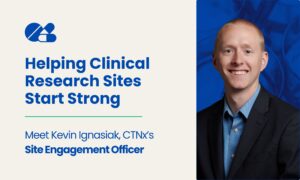


No comment yet, add your voice below!